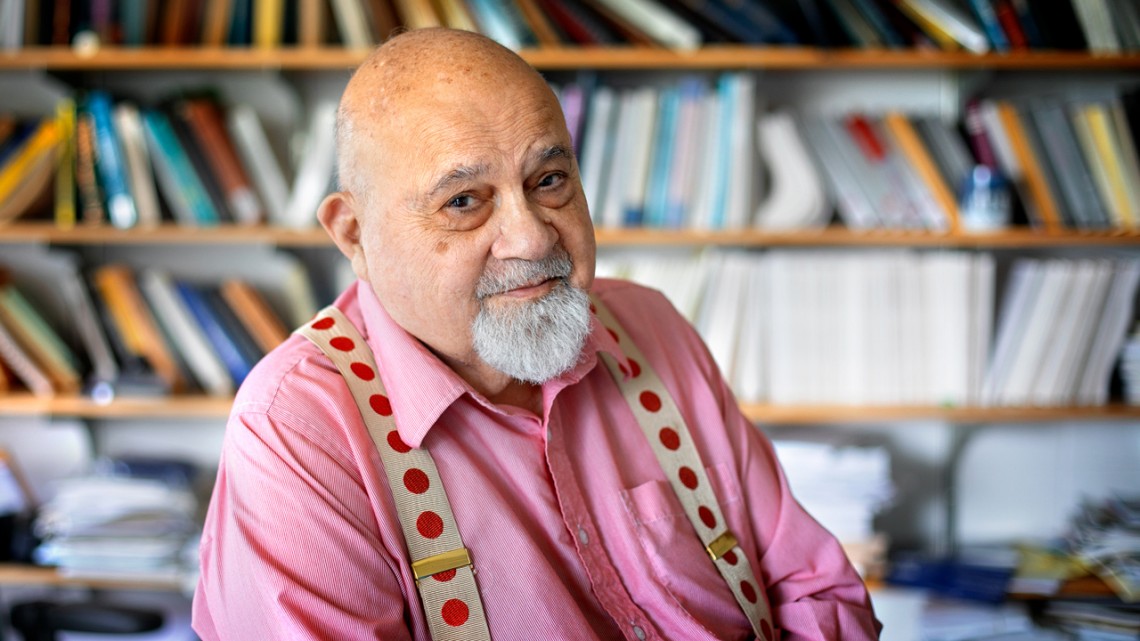
Anil Nerode, the Goldwin Smith Professor of Mathematics.
After years of wandering, longest-serving professor finds a home at Cornell
By Melanie Lefkowitz
Anil Nerode spent his childhood on the move.
As the son of an itinerant yogi living in the United States, “I went to around 50 grammar schools in 50 places,” said Nerode, the Goldwin Smith Professor of Mathematics in the College of Arts and Sciences. “I was never anywhere more than a few weeks.”
So in 1959, when he found a place he liked – Cornell – he settled down and stayed put.
Sixty years later, he’s believed to be the longest serving faculty member in university history.
Along the way, he helped found Cornell’s computer science department, advised more than 55 doctoral students – a Department of Mathematics record – and made important contributions to scholarship in logic, mathematics, computer science, systems and control theory.
“Serving as an active faculty member for 40 or 50 years is truly remarkable. But 60 years!” wrote President Martha E. Pollack, Provost Michael Kotlikoff and Dean of Faculty Charles Van Loan in an April 2019 letter congratulating Nerode. “Our records show that no faculty member in the history of the university has ever reached this milestone – you are unique! Moreover, your contributions have been extraordinary.”
It just as easily could have turned out differently, Nerode said.
He decided to study math because the math professors were friendlier than the physics professors at the University of Chicago, where he got his bachelor’s degree at age 16 and Ph.D. at 24. After completing postdoctoral studies at the University of California, Berkeley, he chose to come to Cornell partly because it was beautiful.
“In 1959, I was at Berkeley wondering what would happen to me next year, and I got an unsolicited offer through the mail from Cornell,” Nerode said. “I’d visited in 1957 for a meeting in mathematical logic and thought it was the prettiest place I’d ever seen, so I accepted by the return mail.”
Within a few years, he was acting director of Cornell’s new Center for Applied Mathematics. “At that point, I got various outside offers,” he said, “but I was already a full professor and I didn’t envisage ever leaving the place. I loved it.”
When Nerode arrived at Cornell, “there was a lot of room between the buildings.” Colleagues met regularly in the now-defunct faculty club – which Nerode led as president from 1987-89. He’s watched both the campus and the faculty grow larger and more far-flung, and misses the intimacy of his early years.
He had a front-row seat as the field of computing emerged and then exploded, as part of the group that wrote the first grant proposal to establish Cornell’s computer science department in 1965. At the time, it was among a handful of computer science departments anywhere in the world. Nerode also suggested Juris Hartmanis – who would later win a Turing Award, often called the Nobel Prize of computing – to be the department’s first chair.
“I was absolutely aware that technology was changing at an incredibly rapid rate,” he said. “And I came to the conclusion – and I tried to sell it to a skeptical faculty – that it would permeate every single department because it would eliminate all routine work.”
Nerode’s research career has spanned pure and applied logic, computability, automatic structures and foundations of logic programming. As a student at the University of Chicago, he and John Myhill proved what’s now known as the Myhill-Nerode theorem, a theory of formal languages.
He chaired the math department from 1982-87, and served as director of Cornell’s Mathematical Sciences Institute from 1987-96. He was named the Goldwin Smith Professor of Mathematics in 1991.
“He brings enormous institutional knowledge to the department,” said Ravi Ramakrishna, professor and chair of math and Stephen H. Weiss Presidential Fellow. “Anil is an outstanding scholar. He’s a great adviser of Ph.D. students. And he’s a leader. Not that many people have Ph.D. students finishing in seven different decades (his current student is expected to graduate in the 2020s). That’s amazing.”
Because Nerode has been reading mathematical research papers for more than 70 years, he teaches math from a historical perspective, providing math students and non-majors with the context for the equations and theorems they might use in practice.
“I think there’s a lot of added value in teaching things in the order in which the notions were invented,” Nerode said. “I’ve taught the History of Mathematics at least 50 times, and each time it incorporates different material.”
He continues to advise students, teach classes and do research – an ability he partly credits to his childhood training in yoga, breathing and concentration.
“The concentration and meditation exercises always gave me an enormous advantage over other talented people,” Nerode said. “It’s invaluable for doing mathematics. Normally, you do mathematics for the day, you try to make notes at the end, you go to sleep and your whole thought’s broken. When I was young, in my 20s and 30s, I could work for four or five days. I simply had the breath control for it.”
Spending his youth in what he described as a “chaotic yoga environment” also gave him an appreciation for the academic life.
Said Nerode: “I’ve never found anything to dislike about it.”
Media Contact
Get Cornell news delivered right to your inbox.
Subscribe
